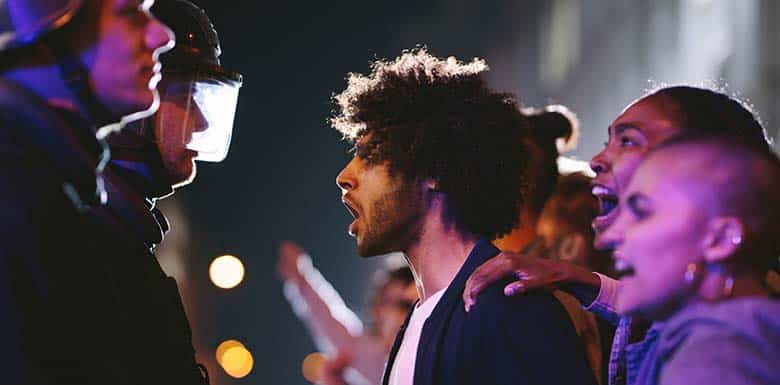Home | Defenses Against Rioting Charges in Indianapolis
Legal Blog
Defenses Against Rioting Charges in Indianapolis
26 September 2022 | Assault & Domestic Violence, Criminal Defense,

Are you planning on taking to the streets to protest a political decision that you disagree with, or are you planning on protesting an action by authorities?
While it is your right to protest in public, there are penalties when a gathering crosses into rioting territory. It’s essential to know how to avoid charges and be prepared with rioting defenses in case you are arrested.
The First Amendment protections cover your right to free speech; however, there is a limit. When a gathering becomes an unlawful assembly or rioting, law enforcement can take action against those involved.
Protected assembly situations include freedom of speech in public places like a sidewalk or parks. In some locations, you may legally need a permit to assemble for a protest. Cities often use these permits to plan how many police officers will need to be present to maintain order. Any violence or illegal actions could result in criminal charges.
A common criminal charge at protests is “rioting.” Unlawful assembly and rioting are made illegal by Indiana Code Section 35-45-1-2, which prohibits “recklessly, knowingly, or intentionally engaging in tumultuous conduct.” Tumultuous conduct is broadly defined as any action that results in or is likely to result in serious bodily injury or substantial property damage.
Rioting is a Class A misdemeanor in Indiana. The penalties for this crime include up to one year in jail and a fine of up to $5,000.
If the person is armed with a deadly weapon, they may be charged with a Level 6 felony. Penalties for a Level 6 felony could be between six months and two and a half years in prison and a fine of up to $10,000.
People who are engaged in unlawful protests may also be charged with other crimes, including the following:
Misdemeanors are categorized as Class A through C, with Class A being the most serious. Felonies are categorized as Level 1 through 6, with Level 1 being the most serious. More serious crimes result in significant penalties.
Senate Bill 285 would have allowed police to use “any means necessary” to remove protesters from a roadway. The bill was eventually amended to allow only a ticket and fine to protesters. Both versions of the bill failed to be approved by the Indiana legislature.
If you are arrested and charged with a rioting-related charge, then there are defenses that you can present to support your case. With the help of an experienced criminal defense attorney, you may even be able to have your charges dismissed.
The First Amendment of the U.S. Constitution guarantees you a right to free speech. While that right has been tested, it is not unlimited. Generally, it is not constitutionally protected if used to promote lawless actions. Many rioting charges include terms like “promoting” or “inciting.”
You can defend against rioting charges by showing that you were simply exercising your free speech and did not take any illegal actions.
You can also point out that you did not encourage anyone else to act outside the law. This may require evidence from eyewitnesses, police body cameras, and other people recording public interactions.
You also have a Constitutional right to assemble peacefully in public. You could defend criminal rioting charges by showing there was a permit to assemble at the protest you were attending lawfully.
The police often use violence in response to peaceful protesters. Sometimes that incites violence in return. You may not have initiated any violent actions; however, you may be the victim of police battery.
If law enforcement or counter-protesters threaten you, you may be forced to act in self-defense. In this case, your actions may be excused as an affirmative defense, and your charges may be dropped in some situations.
An experienced criminal defense lawyer can help you gather evidence to support your arguments if you have been charged with a rioting-related offense in Indiana. It’s essential to work with a criminal lawyer in Indianapolis who understands the nuances of the law and can use that information to protect clients.
Attorney Sean Hessler with Hessler Law PC has helped countless clients facing serious criminal charges that may impact their lives in the long term. Call today at (317) 886-8800 or contact us online for a consultation.